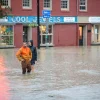Japan is poised to begin discharging a significant quantity of treated radioactive water from the Fukushima nuclear plant into the Pacific Ocean, a decision that has sparked substantial controversy and criticism from neighboring countries.
This move, slated to start this Thursday, marks over a decade since the Fukushima disaster triggered by the 2011 earthquake and tsunami. The plant, located on Japan’s east coast, suffered severe damage, leading to roughly 1.3 million metric tons of treated wastewater buildup—equivalent to about 500 Olympic-sized swimming pools.
Japanese Prime Minister Fumio Kishida has stated that releasing this water, filtered through the ALPS (Advanced Liquid Processing System), is a necessary step in decommissioning.
He emphasized that the discharge, which will take decades to complete, is considered safe by the Japanese government and endorsed by the International Atomic Energy Agency (IAEA).

According to the IAEA, the planned release adheres to international standards and is expected to have a “negligible” impact on people and the environment.
However, this plan has met with strong opposition from neighboring countries and local stakeholders. China has condemned Japan’s actions as “extremely selfish and irresponsible,” urging Japan to halt the discharge and seek more responsible solutions.
Hong Kong has responded by imposing import restrictions on some Japanese food products. South Korea has expressed skepticism and witnessed protests against the plan, although it acknowledges no scientific issues with the proposed water release.
Environmental and human rights groups, including Greenpeace, have criticized the plan, arguing it represents a harmful approach to marine pollution. They assert that the environmental impact on regional ecosystems and local communities could be significant.
In contrast, experts like Nigel Marks and Tony Hooker have argued that the tritium in the wastewater is relatively harmless and that similar releases have historically posed no serious health risks. Despite this, the debate continues as Japan moves forward with its controversial plan.

